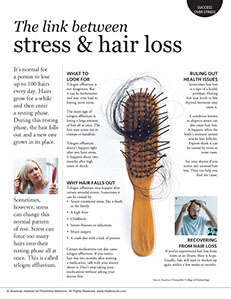SYMPTOM CHECKER
CONDITIONS
Male
Female
Child
Arm, Hand & Shoulder Concerns
Legs & Feet Concerns
Dental & Mouth Concerns
Ear & Nose
Eye Conditions
Head Conditions
Arm, Hand & Shoulder Concerns
Legs & Feet Concerns
Front
Back
Arm, Hand & Shoulder Concerns
Dental & Mouth Concerns
Ear & Nose
Eye Conditions
Head Conditions
Arm, Hand & Shoulder Concerns
Dental & Mouth Concerns
Ear & Nose
Eye Conditions
Head Conditions
Front
Back
Arm, Hand & Shoulder Concerns
Neck Links
Head & Neck Concerns
Arm, Hand & Shoulder Concerns
Neck Links
Head & Neck Concerns
Front
Back
Online Clinic
Wise Healthcare
The link between stress & hair loss
Print on Demand
It’s normal for a person to lose up to 100 hairs every day. Hairs grow for a while and then enter a resting phase. During this resting phase, the hair falls out and a new one grows in its place.
Sometimes, however, stress can change this normal pattern of rest. Stress can force too many hairs into their resting phase all at once. This is called telogen effluvium.
What to look for
Telogen effluvium is not dangerous. But it can be bothersome and may even lead to having more stress.
The main sign of telogen effluvium is losing a large amount of hair all at once. The hair may come out in clumps or handfuls. Telogen effluvium doesn’t happen right after you have stress. It happens about two months after high stress or shock.
Why hair falls out
Telogen effluvium may happen after certain stressful events. Sometimes it can be caused by:
• Severe emotional stress, like a death in the family
• A high fever
• Childbirth
• Severe illnesses or infections
• Major surgery
• A crash diet with a lack of protein
Certain medications can also cause telogen effluvium. If you notice hair loss two months after starting a medication, talk with your doctor about it. Don’t stop taking your medications without asking your doctor first.
Ruling out health issues
Sometimes hair loss is a sign of a health problem. Having low iron levels or low thyroid hormone may cause it.
A condition known as alopecia areata can also cause hair loss. It happens when the body’s immune system attacks hair follicles. Experts think it can be caused by stress in some cases.
See your doctor if you notice any unusual hair loss. They can help you find the cause.
Recovering from hair loss
If you’ve experienced hair loss from stress or an illness, there is hope. Usually, hair will start to thicken up again within a few weeks or months.
Source: American Osteopathic College of Dermatology
This website is not meant to substitute for expert medical advice or treatment. Follow your doctor’s or health care provider’s advice if it differs from what is given in this guide.
The American Institute for Preventive Medicine (AIPM) is not responsible for the availability or content of external sites, nor does AIPM endorse them. Also, it is the responsibility of the user to examine the copyright and licensing restrictions of external pages and to secure all necessary permission.
The content on this website is proprietary. You may not modify, copy, reproduce, republish, upload, post, transmit, or distribute, in any manner, the material on the website without the written permission of AIPM.
2021 © American Institute for Preventive Medicine - All Rights Reserved. Disclaimer | www.HealthyLife.com
















































